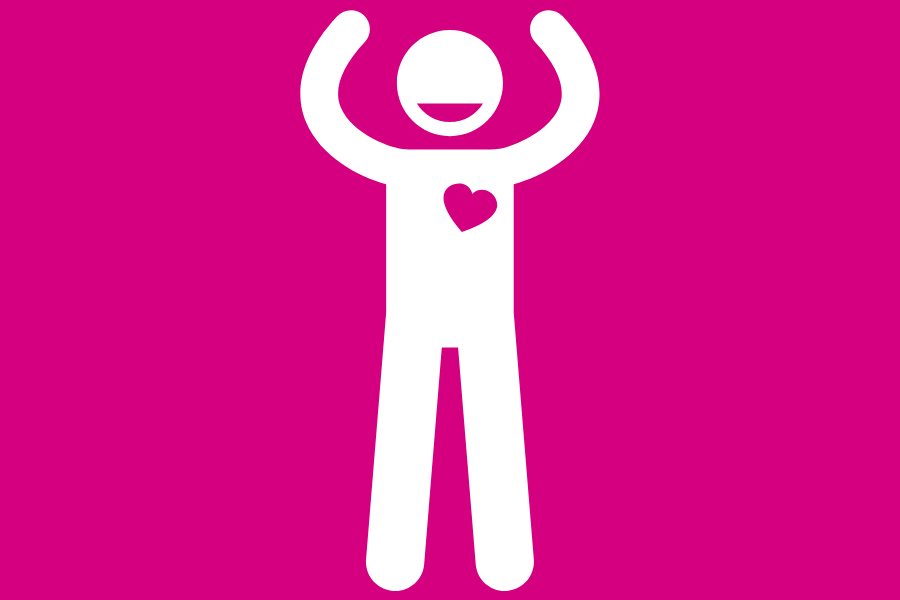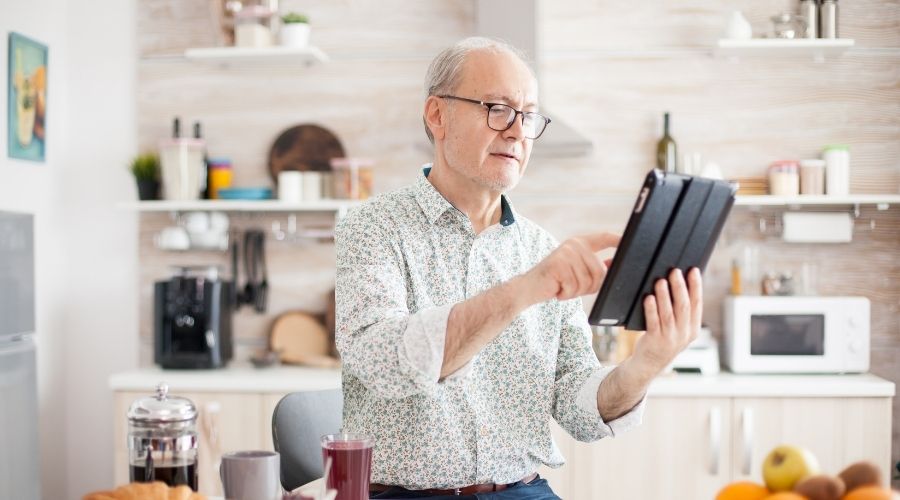Ten top tips for good health in later life

1. Eat a balanced diet
This is crucial for good health, energy, and keeping illness at bay. An ideal diet should be low in saturated fat, with lots of fruit and vegetables, whole grains, oily fish, and small amounts of low-fat dairy and lean meat. Try to think about the colour on your plate – the more colours, the better!
Don’t forget to top up with lots of water to avoid dehydration. Tea, coffee, and fruit juice will also help you to stay hydrated but avoid sugary fizzy drinks. Check out the NHS advice about eating a balanced diet to find out more.
2. Take your hearing and eye tests
Getting older leads to our hearing and eyesight can be affected, so it’s important to get them checked regularly. Hearing loss is common in older people so see your doctor if you feel like it is getting worse. If you need a hearing aid, you will be referred to specialist help and some are available on the NHS.
Have an eye test every year if you are aged 70 or over, and every two years if you are under 70. This means that changes in your vision can be corrected and any problems can be picked up before they seriously affect your sight. If you are over 60, eye tests are free of charge through the NHS, usually every two years. If you receive Pension Credit, you might be eligible for vouchers towards the cost of glasses and contact lenses, to find out more visit the NHS website.
3. Stay as active as you can
Daily exercise helps you to stay strong and healthy. This will lower your risk of several medical conditions including obesity, heart disease, stroke, diabetes, and even cancer. Keeping active can also boost your self-esteem, improve your sleep, and give you more energy.
Government guidelines recommend that older adults do 150 minutes of moderate-intensity activity per week, as well as strengthening exercises twice a week.
Start small and your fitness and ability will improve over time.
Read our top tips for heart health >
4. Look after your teeth
Brush and floss twice a day. Flossing helps to prevent gum disease by removing pieces of food and plaque from between the teeth. If you struggle to handle the taped floss, you can buy floss sticks or an electrical water flosser.
5. If you smoke, try to stop!
Smoking is linked to a whole range of health problems like heart disease, lung cancer, and bronchitis.
There’s a range of options available to help you quit, so if something doesn’t work the first time then it’s worth trying another way. Talk to your GP or pharmacist about how they can help you. They might suggest:
- Prescribed medications
- Nicotine products such as gum, lozenges or patches
- Signposting you to your local NHS Stop Smoking Service – one-on-one or group support combined with stop smoking medications or nicotine products.
You can get a free quitting plan and app on the NHS Quit Smoking scheme.
6. Have your NHS health check and try the NHS How Are You? Quiz
Ring your GP for your NHS Health Check. This is a check-up for adults in England aged 40-74 years old. It can help spot early signs of a stroke, kidney disease, heart disease, type 2 diabetes or dementia. The doctor will be able to advise you on exercises to help and they may prescribe medication too if needed.
Whilst you’re there, why not ask your doctor about the seasonal flu jab? If you’re over 65 or if you have a health condition that puts you at risk of more serious problems if you caught the flu, it’s free of charge.
The NHS How Are You? Quiz is a free, 10-minute quiz that gives you a personalised health score. It’s not a medical assessment – if you’re worried about your health you should speak to a health professional.
7. Get a good night's sleep
As we age, it can become more difficult to get to sleep (and to stay asleep too). You might want to try these things:
- Sleeping with an eye mask on to block out any light
- Avoid napping too late in the afternoon
- Establishing a bedtime routine - going to bed at the same time each night
- Drinking a cup of malted drink like Horlicks (avoid alcohol before bed!)
- Keep your bedroom at a comfortable temperature - not too hot or too cold. If you find you get cold in the night you could add some bed socks to your night attire and a blanket. If you find you're too hot, investing in a fan might be the best option.
- Having a bath or doing something relaxing before bed like reading
- Avoid screens (TVs, tablets and mobile phones) up to an hour before you're due to go to bed.
8. Stay in touch with people
Spending time with other people can prevent you from feeling lonely or anxious. If you find that you are no longer able to do the things you used to do, try to develop new hobbies and interests or think about becoming a volunteer.
Use video calling tools like Skype, FaceTime (for iPhone users), Whatsapp video call, or Zoom to make video phone calls to friends and family who don’t live nearby.
If you are a widow/widower, we have some advice for widows/widowers >
MHA also offers a befriending service – you can have a volunteer visit your home or remote befrienders who can telephone you or use an online video service. Find out more about befriending services >
9. Get your vitamin D
It’s estimated that Vitamin D deficiency affects half of the adult population and is linked to cognitive impairment, bone problems, and cardiovascular disease.
If you can, try to get outside in the sunshine for at least 15 minutes a day. Vitamin D can also be found in food such as eggs and oily fish. Or, you could talk to your doctor about a vitamin D supplement.
10. Give your feet some attention
Your feet are important, they carry your weight and help to keep you active. Look after your feet by applying moisturiser to prevent dry skin and cutting your toenails straight across. If you struggle to do this yourself, you can visit a chiropodist or contact them for a home visit. Also make sure you have footwear that fits properly, with good grip, and that supports your feet.
Contact your doctor if your feet become painful, feel very hot or cold, and if you have common problems like corns, bunions, or ingrown toenails.
Page last updated: July 2023.
MHA in your community
Find the care home, retirement community, or support group that’s right for you

